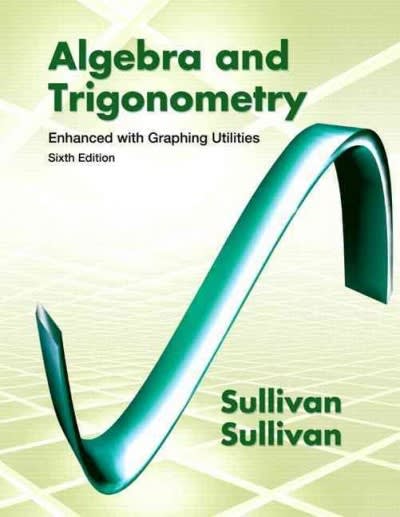Question
Using Excel for Random Variables solve the following: The company wants to study cash flows to determine how much money it should keep in its
Using Excel for Random Variables solve the following:
The company wants to study cash flows to determine how much money it should keep in its checking accounts to pay claims. There are two types of claims: "repair" claims, and "totaled" claims. After reviewing historical data, the company has determined that the number of repair claims filed each week is a random variable that follows the probability distribution shown in the following table:
| # Repair Claims | 0 | 1 | 2 | 3 | 4 | 5 | 6 | 7 | 8 | 9 | 10 |
| Probability | 0.030 | 0.106 | 0.185 | 0.216 | 0.189 | 0.132 | 0.077 | 0.039 | 0.017 | 0.007 | 0.002 |
The company has also determined that the average cost per repair claim is normally distributed with a mean of $1,200 and standard deviation of $300 (with no negative values). To be clear, the costs of covering of each individual repair claim are notnormally distributed; rather, the average cost per repair claim for a given week is normally distributed with a mean of $1,200 and a standard deviation of $300. In addition to repair claims, the company also receives claims for cars that have been "totaled" and cannot be repaired. There is a 15% chance of receiving one claim of this type in any week, and there is no chance of receiving more than one in any week. The cost for "totaled" cars is given by the following: $7500 * X, where X is a log-normal random variable with a mean parameter of 0.15 and a standard deviation parameter of 0.5.
- Develop a descriptive model of this scenario; identify and name random and non-random variables along the way. You may develop a flowchart for yourself to help you visualize, but do not attach it to the submission.
Random:
Number of Repair Claims/Week (nr)
Average Cost/Repair Claim (cr)
Number of Totaled Claims/Week (nt)
Cost/Totaled Claim (ct)
Non-Random:
Total Repair Cost/Week (tr): nr*cr
Total Cost of Totaled Claims (tt): nt*ct
Total Cost of All Claims (tc): tr+tt
- List all random variables, their distributions, and parameters.
Number of Repair Claims/Week (nr):
Distribution: Custom Discrete
Cumulative Distribution Function
| Previous CDF | Number | Probability | CDF |
| 0 | 0 | 0.03 | 0.03 |
| 0.03 | 1 | 0.106 | 0.136 |
| 0.136 | 2 | 0.185 | 0.321 |
| 0.321 | 3 | 0.216 | 0.537 |
| 0.537 | 4 | 0.189 | 0.726 |
| 0.726 | 5 | 0.132 | 0.858 |
| 0.858 | 6 | 0.077 | 0.935 |
| 0.935 | 7 | 0.039 | 0.974 |
| 0.974 | 8 | 0.017 | 0.991 |
| 0.991 | 9 | 0.007 | 0.998 |
| 0.998 | 10 | 0.002 | 1 |
Average Cost/Repair Claim (cr):
Distribution: Normal
Mean: 1200
Standard Deviation: 300
Number of Totaled Cars (nt):
Distribution: Binomial
Number of Trials: 1
Success Probability: 15%, 0.15
Cost/Totaled Car (ct) = 7500*X
Distribution: Log-normal
Mean: 0.15
Standard Deviation: 0.5
- Code the model in Excel and replicate it 10,000 times. Answer the following questions (do not attach the spreadsheet):
- What is the weekly average cost of all claims?
$5588.45 / week
- Suppose that the company decides to keep $15,000 cash on hand to pay claims. What is the probability that this amount will not be adequate to cover claims in any given week?
0.0506 (5.06%)
Step by Step Solution
There are 3 Steps involved in it
Step: 1

Get Instant Access to Expert-Tailored Solutions
See step-by-step solutions with expert insights and AI powered tools for academic success
Step: 2

Step: 3

Ace Your Homework with AI
Get the answers you need in no time with our AI-driven, step-by-step assistance
Get Started


